Devjyot Ghoshal in New Delhi
From mid-December, about 100,000 Class IX students in 1,000 government schools across 10 districts of Bihar will spend two hours on Saturdays reading a glossy storybook, probably the best designed ones that they have ever read.
It could be a simple story about a young girl, Misti, and how she started a business of selling second-hand shoes.
Or it could be about another girl, Bijli, and what she did to bring a travelling fair to her village.
These are among the 31 storybooks that the Bihar government has mandated to be taught in government schools.
The photograph is for representative purpose only
. . .
Taking entrepreneurship to the heartland's young
Image: Girls study under lamps in Bihar.Yet, these are not merely wonderfully illustrated tales, written in Hindi, about enterprising, young Indians.
Instead, at the end of each book is a creative exercise, a task to be completed through the following weekend, crafted to teach these middle-school students basic entrepreneurial skills.
These could be as simple as understanding the importance of punctuality, or as complex as making business and financial plans for a small venture.
The underlying idea through it all, however, is to teach some of the most underprivileged of India's school students the basics of entrepreneurship through stories that can inspire.
The photograph is for representative purpose only
. . .
Taking entrepreneurship to the heartland's young
Image: Girls on their way to a government school in Patna.Photographs: Archana Masih/Rediff.com
"It is about the power of stories and that stories for the poorest children can change the way they see their lives and opportunities," says Lisa Heydlauff, founder and director of Going to School, a non-profit start-up that signed a memorandum of understanding with the Bihar government in January 2012 to take their books to government schools in the eastern state.
"We already had activities for primary schools, but nothing for secondary school students," says Kiran Kumari, state project officer, department of education, Bihar.
"We wanted to change the orientation of our students through capacity and skill development, and when we tried this out in five schools first, the response from the students was great."
The photograph is for representative purpose only
. . .
Taking entrepreneurship to the heartland's young
Image: A 2007 photograph of a village school in Islampur, Bihar.Photographs: Seema Pant/Rediff.com
Since the start of the 2012-13 academic session, Going to School began establishing the programme in schools across two districts.
From each school that was brought under its purview, two teachers were initially trained, alongside an orientation to the scheme for the school principals.
"These teachers would then go back to the school to conduct a baseline survey to evaluate the children's basic level.
"The survey would understand whether most students would like to start a business or find a job; or, for girls, if they would like to work or get married," explains Satyam Vyas, who handles the Bihar programme at Going to School.
The photograph is for representative purpose only
. . .
Taking entrepreneurship to the heartland's young
Photographs: Archana Masih/Rediff.com
In Patna, for instance, the survey revealed that about 95 per cent of girl students wanted to start their own business.
Out of them, however, only 10 per cent felt confident that the male members of their households would support their venture.
"That is still a huge change from five years ago when every girl wanted to be a teacher," reasons Heydlauff, "We've never asked children these questions before."
Once the programme gets going, each week's activities are closely monitored by the Going to School team and all assignments are graded centrally, with evaluation reports submitted to the state government, district administration and the schools.
The photograph is for representative purpose only
. . .
Taking entrepreneurship to the heartland's young
Photographs: Illustration by Dominic Xavier/Rediff.com
The non-profit has two staff overseeing the programme's performance in each district, alongside one government official.
The overall objective is to ensure that at least 60 per cent of the 100,000 students complete the 31-week-long programme.
"It's never been done before at this kind of scale, which is teaching entrepreneurial skills to children through stories in the government system," says Heydlauff, "That content didn't exist before in India, and it's been made for children based on research with kids."
. . .
Taking entrepreneurship to the heartland's young
Photographs: Reuters
Going beyond, and abroad
The journey to build this entrepreneurship-focused content began in 2001, when Heydlauff spent 18 months travelling across the country to write a book on what it was like for children to go to school in different parts of India.
"It was looking at another approach for a developmental intervention," she explains, "At that point, there wasn't any organisation that I knew of in India, which was making stories for social change, for the poorest kids, saying 'Why don't you go to school?'."
After Going to School in India came out in 2004, Heydlauff went on to create Girl Stars, a series of 15 short films and a book on young, female role models from low-income groups.
. . .
Taking entrepreneurship to the heartland's young
Photographs: Reuters
"We didn't have the story of a young person who lives in poverty and decided to start a business to solve a problem," she adds.
"If you look at the issue that by 2020, there will be 210 million unemployed people in India, mostly below the age of 30. We will need young entrepreneurs.
"We need people who can create businesses that solve problems, but also generate income."
That is how 'Be!an Entrepreneur', a series of 50 books, came to be.
After numerous partnerships failed to deliver, Heydlauff founded the Be! Fund, which provides capital and business skill support to young entrepreneurs with for-profit ideas that solve local social problems.
. . .
Taking entrepreneurship to the heartland's young
Photographs: Uttam Ghosh/Rediff.com
With initial support from individuals including iGATE Corporation's Phaneesh Murthy, the Be!Fund corpus is closing on the Rs 1 crore (Rs 10 million) mark.
The Going to School programme in Bihar is the biggest project that Heydlauff has handled in the 10 years that she has worked in this space, and she wants to take it beyond. "We are talking to the Karnataka government," she says.
"The content would be in Kannada and the model would be the same as Bihar, but we have got new content as well."
At the same time, the small, south-Delhi headquartered non-profit is also negotiating with the government of Cameroon for introducing the programme in Africa.
"It is a model that's ready for export, as well. It works very well for emerging markets," says Heydlauff.
. . .
Taking entrepreneurship to the heartland's young
Image: Girls on their way to school.Photographs: Archana Masih/rediff.com
But is it financially viable?
Implemented at scale, Going to School's current model costs about Rs 122 per child per year, of which 50 per cent is the price of the books.
Carefully designed on high-quality paper, these books can cost between Rs 30 and Rs 110 per copy.
Although expensive, Heydlauff is unwilling to compromise on design and quality.
"This is design innovation, that's why it works. If it was low-quality content, in black-and-white or a training manual, then it would be business-as-usual," she adds.
Instead, the question she asks is one that has been raised globally: Who is going to pay for the education of poorest children?
. . .
Taking entrepreneurship to the heartland's young
Image: Girls at an education fest in PatnaPhotographs: Archana Masih/Rediff.com
For the Bihar programme, the state government is covering the cost of training the teachers, while the rest is supported by an overseas private trust and money transfer major, Western Union, has also come in.
The other option, of charging a minimum amount of Re 1 a month per student remains open, as does the possibility of taking this content to well-heeled private schools and charging a premium.
While there is still time for the financial models to evolve, Heydlauff has already begun taking the idea of entrepreneurship to the young in India's sprawling hinterland, one story at a time.
The photograph is for representative purpose only

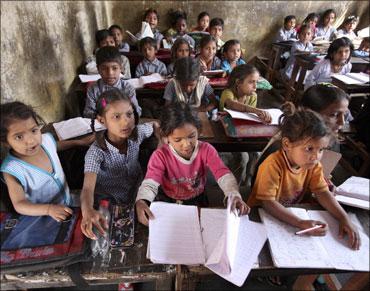
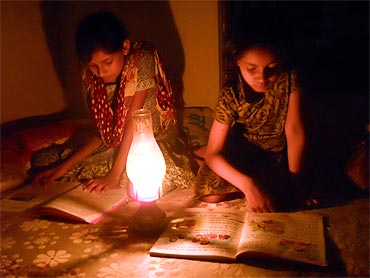
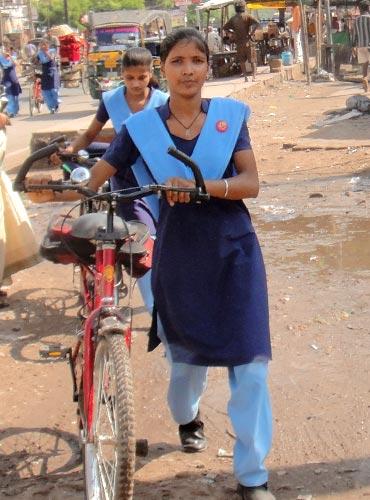
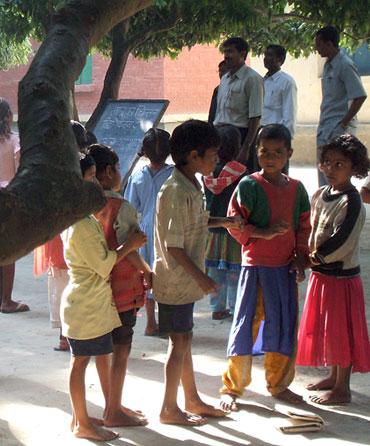
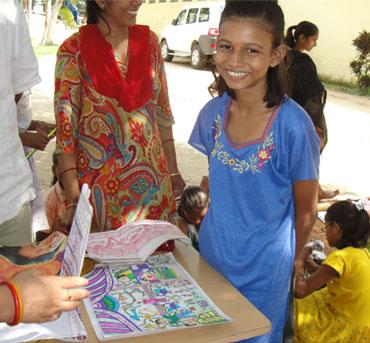




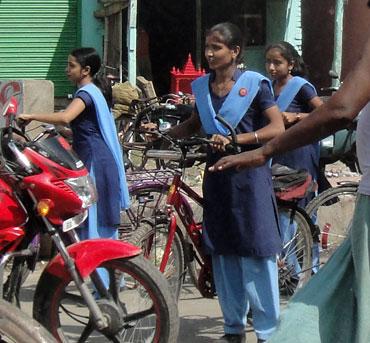
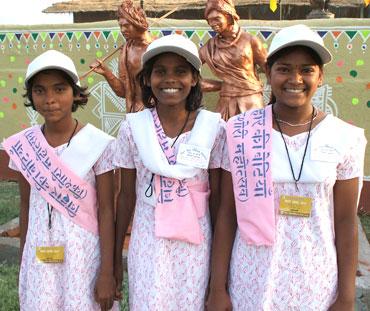

article